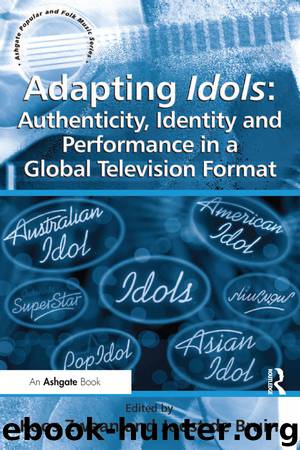Adapting Idols: Authenticity, Identity and Performance in a Global Television Format by Koos Zwaan & Joost de Bruin

Author:Koos Zwaan & Joost de Bruin
Language: eng
Format: epub
Publisher: Ashgate Publishing Limited
Published: 2012-03-16T16:00:00+00:00
Ethnic Identity and Authenticity
Rather than looking for ‘the real’ in reality television, it is increasingly being accepted that within the context of reality television, contestants only ever perform versions of the ‘real’ (Roscoe 2001). From the perspective of audiences, this means, according to Hill (2002, 323), that ‘audiences look for the moment of authenticity when real people are “really” themselves in an unreal environment’. Within the context of Australian Idol, these moments became extremely important, both for the contestants and for the audience, as moments of ‘hyper-authenticity’ reinforced the overall popularity of the contestants and thus their fate and longevity on the show. Authenticity then works on multiple levels that are interrelated in a complex manner, but all of which come into play in the context of Australian Idol.
On the level of music criticism, authenticity has been a key term that has traditionally functioned to ‘establish and then defend the boundaries of what is thought “good” – artistically, politically, morally’ (Leach 2001 cited in Holmes 2004a, 154). Within this ‘elitist’ framework popular music in general occupies the lower ranks of credibility, whilst Australian Idol pop ranks even below that, as the ultimate ‘manufactured’ and therefore inauthentic form of music. By extension, the Idols contestants are seen as ‘not real artists’, but rather commercial ‘sell-outs’. This in turn draws attention to the highly commodified space that is Australian Idol. In other words, the line between performing the authentic ethnic self and selling that same self within the confines of a mainstream commercial media space, and thus in alignment with mainstream expectations of what that ethnic identity entails, is very fine. For example, Stan Walker arguably became the 2009 winner of Australian Idol because he largely focused on an R&B repertoire, which conforms to mainstream expectations about his Maori (indigenous New Zealand) heritage.
Stahl (2004) argues that Idols is a marketing campaign in which the audience plays the role of focus group. Carah (2008), while acknowledging the commodification element, allows for a more productive possibility when he discusses Australian Idol as a ‘brandscape’, which he argues is ‘an authenticity building space, where potential Idols and the audience are guided in identity projects which simultaneously construct authentic subjects and authentic corporate brands’ (Carah 2008, 4). It is the potential construction of authentic subjects that is important for my argument here, because it suggests a space provided by Australian Idol for the performance of the authentic self, even if it is a mediated and commercialized space. Thus, it is on the level of subjectivity and performance that subtle changes in identity construction and representation can be identified. This is a complex negotiation between the Idols audience and the contestants, which hinges on the level of authenticity reached, both in terms of musical authenticity and ethnic identity. As Holmes summarizes: ‘the concept of authenticity is necessarily ambiguous – largely because it is continually being renegotiated in a political struggle and invoked to act as a defense in opposition to an “other”, variously the “inauthentic”, the “fake”, the “commercial”’ (2004a, 154).
Download
This site does not store any files on its server. We only index and link to content provided by other sites. Please contact the content providers to delete copyright contents if any and email us, we'll remove relevant links or contents immediately.
The Goal (Off-Campus #4) by Elle Kennedy(13657)
Kathy Andrews Collection by Kathy Andrews(11812)
Diary of a Player by Brad Paisley(7559)
Assassin’s Fate by Robin Hobb(6199)
What Does This Button Do? by Bruce Dickinson(6195)
Big Little Lies by Liane Moriarty(5790)
Altered Sensations by David Pantalony(5093)
Pale Blue Dot by Carl Sagan(4996)
Sticky Fingers by Joe Hagan(4188)
The Death of the Heart by Elizabeth Bowen(3608)
The Heroin Diaries by Nikki Sixx(3543)
Confessions of a Video Vixen by Karrine Steffans(3301)
Beneath These Shadows by Meghan March(3300)
How Music Works by David Byrne(3259)
The Help by Kathryn Stockett(3139)
Jam by Jam (epub)(3072)
Harry Potter 4 - Harry Potter and The Goblet of Fire by J.K.Rowling(3058)
Computational Linguistics and Intelligent Text Processing: 20th International Conference, CICLing 2019 La Rochelle, France, April 7â13, 2019 Revised Selected Papers, Part I by Alexander Gelbukh(2981)
Strange Fascination: David Bowie: The Definitive Story by David Buckley(2857)
